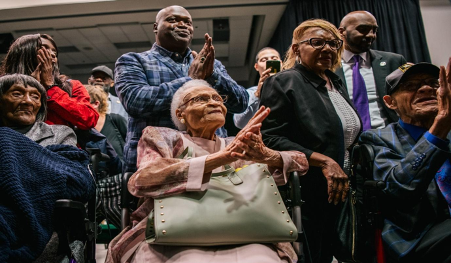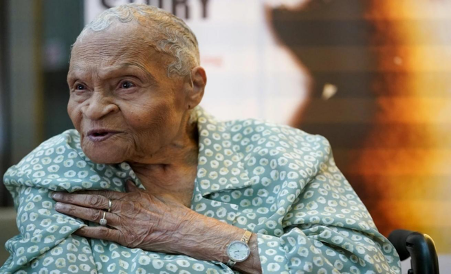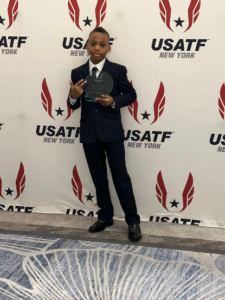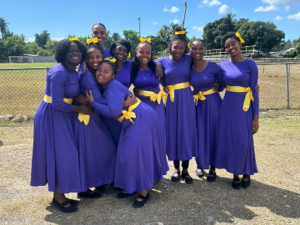
The story of the destruction of Greenwood District of Tulsa, Oklahoma, ranks as one of the darkest days in racial history in America as angry mobs of white people (in the summer of 1921, from May 31 to June 1) stormed the illustrious city, once dubbed “Black Wall Street.”
Above this tumult, a story of faith and a prayer for justice by the mother of one of the survivors, Viola Ford Fletcher, is still speaking today. Mrs. Fletcher turned 110 years old on May 5, and her life has been a testimony of God’s faithfulness and the power of prevailing prayer, even amidst the glaring injustice that occurred in her community when she was a child.
EARLY HISTORY
The district of Greenwood in Tulsa was directly connected to the land given to freed men by their former Native American masters. The land was considered unsuitable for agricultural use but was found to contain petroleum oil. This led to the Oklahoma oil boom, which would generate much of Greenwood’s “black” wealth and even cause Sarah Rector, a Muskogee Creek coloured girl, to be considered one of the richest young black women of those times.
Another outstanding person of the era was O.W. Gurley, who bought 40 acres of land in the Tulsa region and began building out a community he called Greenwood. It was seen as the ideal place for blacks to gather, build businesses, and eke out other opportunities that were not possible under the Jim Crow segregation laws that were in place.
Soon, the city began to thrive and became a hotbed of e

ntrepreneurial activity, which saw black entrepreneurs lending money and assisting new business owners to establish themselves (Gogreenwood.com/history).
This thriving environment produced several noteworthy enterprises, including:
- the Stradford Hotel, a 54-suite luxury establishment that was the largest black-owned hotel in the US at the time;
- Dreamland Theatre, the state’s first black entertainment venue;
- First black airline service in the USA was run by pilot Paul Berry.
So thriving was the community that it was estimated that the “black dollar” circulated within Greenwood more than thirty times before ‘migrating.’ It was, therefore, easy to see the level of interconnectedness within the economy, which led noted author and orator Booker T. Washington to give Greenwood the name, “Black Wall Street.”
THE RIOT
The very laws that had led to the separation of the black and white communities were now working to develop and propel the growth of the Greenwood community. Jealousy soon raged, and a series of accusations levied against a black man that he had assaulted a white woman led to a race riot that saw a mob of white people descend on Greenwood.
Over the span of two days, the mob burned, looted, and destroyed the city, killing some 300 persons and injuring over 800 in the ensuing fracas (https://daily.jstor.org/the-devastation-of-black-wall-street/). What had taken years to build was destroyed in basically 24 hours, leaving damage in the region of $60 billion, based on today’s estimates.
A MOTHER’S PRAYER
Viola Ford Fletcher (now 110 years old and recognised as the oldest living survivor of the attack) was just a 7-year-old girl in the midst of what came to be known as the “Tulsa Race Massacre.” She saw all the atrocities visited upon the community and often heard her mother praying as they worked in open cotton fields after the attack.
In her biography, “Don’t Let Them Bury My Story,”Fletcher vividly recounts that her mother would ask God over and over that “I [Viola] would live to be old enough to see justice for myself and all those who were victims of the massacre.”

She came to realise years later that the words her mother had spoken into the atmosphere, in effect, meant that her daughter, Viola, would live long enough to find justice. Fletcher’s journey so far has resulted in:
- She and two other centenarian survivors of the massacre (Lessie Benningfield Randle and Hughes Van Ellis) initiating legal action in 2020 in the US Supreme Court against the state of Oklahoma, for the wrongs suffered by the Greenwood community. (apnews.com/article/tulsa-race-massacre-survivors-lawsuit)
- Her testifying before Congress on May 19, 2021, regarding the massacre, almost 100 years to the day that the event occurred. This led to House Resolution 215 (H. RES. 215) in the 117th Congress, formally recognising the riot as “one of the largest single instances of state-sanctioned violence against black people in American history.”
- A formal visit to her home by President Joe Biden in 2021, as part of activities marking the 100th anniversary of the Tulsa race massacre
- A visit to Ghana in 2021, where all three survivors of the massacre met with various dignitaries of the country, including the President of Ghana, His Excellency Nana Akufo Addo. They were also hosted at one of Ghana’s megachurches, Action Chapel International Ministry, headed by Archbishop Nicholas Duncan-Williams.
- The publication of her memoir in August 2023, which is now available from Amazon and other select bookstores.
THE COURT CASE
The plaintiffs’ first legal engagement was before Caroline Wall, a district judge in Tulsa County, who decided to dismiss the case after initially ruling that it should be allowed to proceed to trial. This prompted an appeal that saw the matter come before the nine judges of the Oklahoma Supreme Court.
Unfortunately, Fletcher’s brother, Hughes Van Ellis passed away in October 2023, at the age of 102, leaving his sister and Lessie Benningfield Randle (born Nov. 10, 1914) to carry on the charge. Both appeared before the judges on April 2 of this year to continue to press their claim for reparative justice.
Now Viola Ford Fletcher (110 years old) and Lessie Benningfield Randle (109 years old) await what could be the final ruling on the matter, a feat surely empowered by the faith of Fletcher’s mother, who has long gone home to Glory.
MY GOD IS POWERFUL
The issues surrounding this matter are indeed heartrending, but one can take hope in the faith of a praying mother and in the words of Mrs. Fletcher herself:
“My God is a powerful God, and I know the injustices that my people and I have suffered in this nation will one day be atoned for.”
Knowing that the prayers of the righteous do avail much, may we remain steadfast in supplication for those who are facing racial oppression across the world, believing, like the mother of Viola Ford Fletcher, that our faithful God will award justice in due season, in order to bring glory to His name.
(https://www.theguardian.com/world/2024/apr/03/tulsa-race-massacre-restitution-oklahoma)






